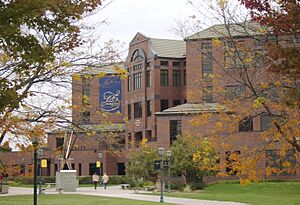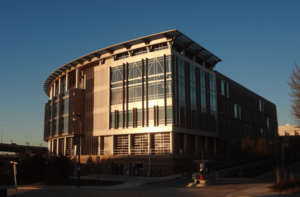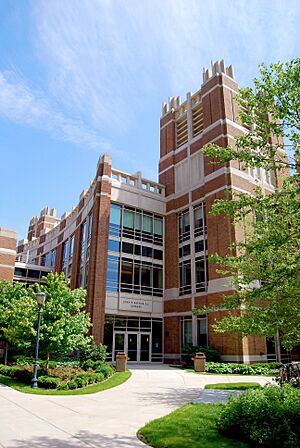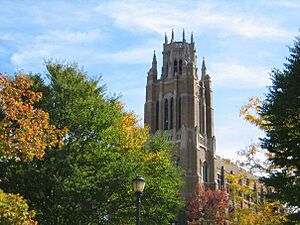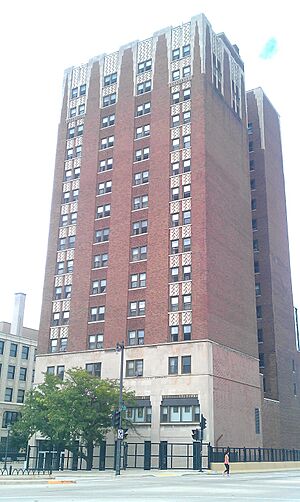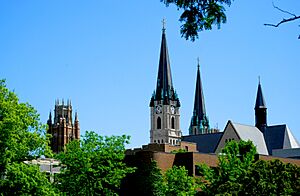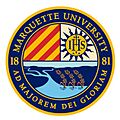Marquette University facts for kids
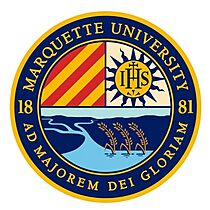 |
|
|
Former names
|
Marquette College (1881–1907) |
|---|---|
| Motto | Ad maiorem Dei gloriam (Latin) |
|
Motto in English
|
"For the greater glory of God" |
| Type | Private research university |
| Established | August 28, 1881 |
| Founder | John Henni |
|
Religious affiliation
|
Catholic (Jesuit) |
|
Academic affiliations
|
|
| Endowment | $997 million (2024) |
| President | Kimo Ah Yun |
|
Academic staff
|
1,186 (fall 2023) |
| Students | 11,373 (fall 2023) |
| Undergraduates | 7,652 (fall 2023) |
| Postgraduates | 3,721 (fall 2023) |
| Location |
,
U.S.
43°02′21″N 87°55′57″W / 43.03917°N 87.93250°W |
| Campus | Urban, 93 acres (37.6 ha) |
| Alma Mater song | Marquette University Anthem |
| Fight song | Ring Out Ahoya |
| Colors | Blue & Gold |
| Nickname | Golden Eagles |
|
Sporting affiliations
|
NCAA Division I – Big East |
| Mascot | Iggy the Golden Eagle |
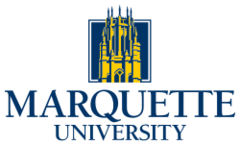 |
|
Marquette University is a private university in Milwaukee, Wisconsin, United States. It was started by John Henni on August 28, 1881. He was the first Archbishop of the Milwaukee Catholic Church.
Marquette is a Jesuit university. This means it is run by the Society of Jesus, a Catholic religious order. It was one of the first Catholic universities to allow both boys and girls to study there, starting in 1909.
The university is part of a group called the Association of Jesuit Colleges and Universities. About 11,000 students attended Marquette in 2023. It is known for its high level of research. Marquette is one of the biggest Jesuit universities in the U.S. It is also the largest private university in Wisconsin.
Marquette has 11 different schools and colleges. They offer programs in many subjects. These include liberal arts, business, communication, education, engineering, law, and health sciences. The university also has classes in nearby towns and in Washington, D.C.. Most students are working on their first college degree. But Marquette also offers many advanced degrees. These include master's and doctoral programs. It has a law school and the only dental school in Wisconsin.
Marquette's sports teams are called the Golden Eagles. They play in the NCAA's Division I and are part of the Big East Conference. Many famous people have studied or taught at Marquette. These include scholars, governors, and U.S. Senators.
Contents
History of Marquette University
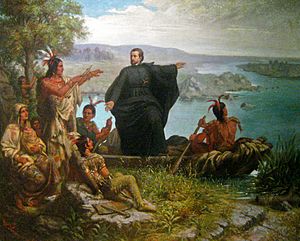
How Marquette College Started
Marquette University began on August 28, 1881. It was first called Marquette College. John Henni, the first Catholic bishop of Milwaukee, founded it. He got help from a businessman named Guillaume Joseph DeBuey. The college was named after Father Jacques Marquette. He was a missionary and explorer from the 1600s.
The main goal was to offer affordable Catholic education. This was for the many German immigrants in the area. The first five students graduated in 1887. By 1906, Marquette had given out many degrees.
Becoming Marquette University
Marquette College became a university in 1907. This happened after it joined with a local medical school. It also moved to its current location. Johnston Hall was the first building on the new campus. It now holds the College of Communication.
In 1908, Marquette started an engineering college. It also bought two law schools. These became the start of its law program. Marquette was originally only for male students. But in 1909, it became the first Catholic university in the world to admit women. By 1916, 375 women were studying there. Other Catholic schools soon followed this example.
Marquette added the Wisconsin College of Physicians and Surgeons in 1913. This created the Marquette University School of Medicine. The university grew quickly in the 1920s and after World War II. New buildings were added for libraries, sports, classrooms, and dorms. More students joined, so more buildings were built. These included schools for law, business, and dentistry.
Marquette was the first in the U.S. to offer a degree in hospital administration. The first two students graduated in 1927. In 1967, the School of Medicine became a separate school. It is now the Medical College of Wisconsin. Marquette's football team, the Golden Avalanche, stopped playing in 1960. After that, basketball became the main sport.
In the 1960s, an old French chapel was moved to campus. It was from the 1400s and was linked to St. Joan of Arc. This chapel, St. Martin de Seysseul, is the oldest building in Wisconsin.
Marquette from the 1970s to Today
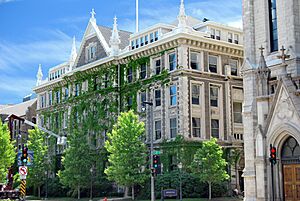
New advanced study programs in arts and sciences began in the 1970s. In 1977, the men's basketball team won the NCAA Championship. They beat the University of North Carolina.
In 1994, the university president decided to change the sports team nickname. It had been "Warriors." This was because of concerns about using Native American mascots. Many alumni and students were upset. But the university eventually chose "Golden Eagles." In 2005, there was another debate about the mascot. The name was briefly changed to "the Gold." But it went back to "Golden Eagles" a week later.
In the 1990s, Marquette spent $50 million to improve the area around campus. This was called the Campus Circle Project. It also opened a study center in Washington, D.C. This center, the Les Aspin Center for Government, is for students interested in public service. New business and adult education programs also started.
In 1996, Robert A. Wild became the university's 22nd president. He started a big fundraising effort. This led to campus improvements and new buildings. A new School of Dentistry building was one of them. Student numbers grew, and new students had higher test scores.
Marquette continued to grow in the early 2000s. New dorms, a library, and sports facilities were built. In 2003, the men's basketball team reached the Final Four. This helped the university gain national attention. By 2006, a fundraising campaign raised over $357 million.
Marquette received its two largest donations in the same school year. An anonymous couple gave over $50 million to the university over time. In December 2006, they gave $25 million to the College of Engineering. In May 2007, Raymond and Kathryn Eckstein gave $51 million. This gift helped the Marquette University School of Law. It was the largest gift ever given to a Wisconsin university.
In 2013, former president Robert A. Wild returned as interim president. This was after the previous president, Scott Pilarz, resigned. Michael Lovell became president on July 1, 2014. He was the first president who was not a Catholic clergyman.
On February 28, 2022, Marquette changed its university seal and motto. The new seal shows three rivers and wild rice plants. This represents the local Native American nations. The new motto is "Ad majorem Dei gloriam." This is a Jesuit motto meaning "For the greater glory of God."
On June 9, 2024, President Michael Lovell passed away at age 57.
Challenges and Changes
On May 16, 1968, African-American students protested at Marquette. They asked for an African-American administrator to be hired. This led to changes at the university.
In 2014, a student had a disagreement with a teacher about classroom discussions. The student shared this with a professor, John McAdams. He wrote about it on his blog. McAdams was suspended for not apologizing. This led to discussions about academic freedom at the university.
Marquette Campus Life
Marquette's campus is about 93 acres. It is located near downtown Milwaukee. Lake Michigan is about one mile east of campus. The campus stretches 12 blocks east to west. Wisconsin Avenue goes through the campus. Academic buildings are on the south side. Dorms and offices are on the north side. The Marquette Interchange, where two major highways meet, is also near campus.
Marquette also has a sports facility called Valley Fields. It has stadiums for track and field, lacrosse, and soccer. This facility is about one mile south of the main campus. The university also owns property in Washington, D.C. This is home to the Les Aspin Center for Government. It is a program for students interested in public service.
In 2016, Marquette's College of Nursing opened a satellite campus. It is in Pleasant Prairie, Wisconsin. This campus is for a special nursing program. In 2017, the university announced plans for a $600 million project. This project will improve the Milwaukee campus. It includes new facilities for science, recreation, and sports research.
Academics at Marquette
Marquette University has 11 schools and colleges. These include:
- The Helen Way Klingler College of Arts and Sciences
- The College of Business Administration
- The J. William and Mary Diederich College of Communication
- The College of Education
- The College of Engineering
- The College of Health Sciences
- The College of Nursing
- The College of Professional Studies
- The Graduate School
- The Marquette University School of Dentistry
- The Marquette University Law School
The largest college at Marquette is the Helen Way Klingler College of Arts and Sciences.
Becoming a Student
| Admissions statistics | |
|---|---|
|
2022 entering
classChange vs. 2017 |
|
| Admit rate | 87.2%
(
|
| Yield rate | 14.3%
(
|
| Test scores middle 50%* | |
| SAT Total | 1180–1350 (among 17% of FTFs) |
| ACT Composite | 26–31 (among 30% of FTFs) |
|
|
U.S. News & World Report says Marquette University is "more selective." For students who started in fall 2022, Marquette received over 15,800 applications. It accepted about 13,800 students (87.2%). Of those accepted, about 1,980 chose to attend. This is a yield rate of 14.3%.
About 89.5% of freshmen return for their second year. About 82.5% graduate within six years. For students who started in 2022, the middle 50% of ACT scores were between 26 and 31. The middle 50% of SAT scores were between 1180 and 1350.
Marquette helps students who receive National Merit Scholarships. In 2020, it sponsored 1 Merit Scholarship award. In the 2020–2021 school year, two freshmen were National Merit Scholars.
| 2022 | 2021 | 2020 | 2019 | 2018 | 2017 | |
|---|---|---|---|---|---|---|
| Applicants | 15,883 | 16,270 | 15,324 | 15,078 | 15,574 | 12,957 |
| Admits | 13,851 | 14,034 | 12,641 | 12,509 | 12,717 | 11,574 |
| Admit rate | 87.2 | 86.3 | 82.5 | 83.0 | 81.7 | 89.3 |
| Enrolled | 1,983 | 1,657 | 1,651 | 1,977 | 2,164 | 2,023 |
| Yield rate | 14.3 | 11.8 | 13.1 | 15.8 | 17.0 | 17.5 |
| ACT composite* (out of 36) |
26-31 (30%†) |
25-30 (37%†) |
25-30 (60%†) |
24-29 (79%†) |
24-30 (81%†) |
24-29 (89%†) |
| SAT composite* (out of 1600) |
1180–1350 (17%†) |
1200–1350 (13%†) |
1170–1320 (25%†) |
1140–1310 (32%†) |
1150–1320 (32%†) |
1130–1310 (17%†) |
| * middle 50% range † percentage of first-time freshmen who chose to submit |
||||||
University Rankings
| THES World | 801–1000 |
|---|---|
| USNWR National University | 86 |
| Washington Monthly National University | 116 |
| Forbes | 114 |
The Wall Street Journal and College Pulse ranked Marquette 56th in its "2024 Best Colleges in the U.S." list.
For 2025, U.S. News & World Report ranked Marquette 86th among national universities. It was also ranked 17th for "Best Undergraduate Teaching." It was tied for 38th for "Most Innovative Schools" and 51st for "Best Value Schools." The magazine also ranked Marquette 54th for military veterans.
Forbes ranked Marquette 84th among research universities in 2024-25. It was 114th overall. In 2015, the QS World University Rankings placed Marquette among the top universities worldwide.
In 2020, Princeton Review named Marquette one of the "Best 386 Colleges in the U.S." It was also one of the best schools in the Midwestern U.S. In 2018, Kiplinger's Personal Finance magazine ranked Marquette 75th among private universities for best value.
College and Program Rankings
As of 2023, U.S. News & World Report ranked several of Marquette's graduate programs. The graduate statistics program was 86th. English was 108th, history 113th, and psychology 122nd. Biological sciences were tied for 186th. Chemistry was tied for 136th, and computer science was tied for 152nd.
Marquette's undergraduate engineering program was tied for 142nd in 2021. Its part-time MBA program was tied for 53rd in 2023. The Marquette University Law School was ranked 71st in 2023. Some of its law programs were in the top 50.
The College of Education's graduate degree was tied for 112th in 2021. The physical therapy program was tied for 13th best in the nation in 2023. The physician assistant program was tied for 26th. The speech-language pathology program was tied for 55th. For 2023, Marquette's undergraduate nursing program was 29th best. Its graduate nursing programs also ranked highly.
Student Life at Marquette
Student Population
| Race and ethnicity | Total | ||
|---|---|---|---|
| White | 69% |
|
|
| Hispanic | 15% |
|
|
| Asian | 6% |
|
|
| Black | 4% |
|
|
| Other | 4% |
|
|
| Foreign national | 2% |
|
|
| Economic diversity | |||
| Low-income | 22% |
|
|
| Affluent | 78% |
|
|
Marquette has about 11,749 students. They come from all 50 U.S. states and over 65 countries. About 8,293 are undergraduate students. The rest are graduate and professional students. Twenty-nine percent of students are from Wisconsin. Thirty-seven percent are from Illinois.
More than half of the students (53%) are female. Sixty-eight percent identify as Catholic. Most students (about 90%) return for their second year.
Marquette has a program called Educational Opportunity Program (EOP). This program helps students from low-income families. It also helps students whose parents did not go to college. It provides support, counseling, and financial aid. This helps them succeed in higher education.
Student Housing
Marquette uses many existing buildings as residence halls (dorms). Charles Cobeen Hall and M. Carpenter Tower were once hotels. Glenn Humphrey Hall was a children's hospital. David Straz Tower was a YMCA. Mashuda Hall was a motor inn where The Beatles stayed in 1964. Abbottsford Hall was a hotel. These buildings have all been turned into student housing.
Of the nine current dorms, only three were built by the university. These are O'Donnell Hall, Schroeder Hall, and McCormick Hall. McCormick Hall was replaced by a new dorm called The Commons. Another new dorm, Dr. E. J. And Margaret O'Brien Hall, was built where McCormick Hall used to be.
Clubs and Activities
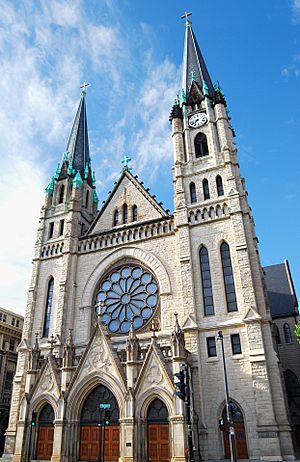
Marquette University has over 230 student organizations. Students can join many different groups.
Greek Life
Marquette University has 23 Greek organizations. About 10% of undergraduate students are part of Greek life. Sororities (for women) are a bit more popular than fraternities (for men). The engineering sorority Alpha Omega Epsilon was founded at Marquette in 1983.
Performing Arts
Marquette has many performing arts groups. The Studio 013 Refugees is a student improv comedy group. They perform free shows and offer workshops. The Marquette University Players Society (MUPS) performs in a theater.
The Marquette University Chorus is a mixed choir. There are also Men's Choir, Women's Choir, and Chamber Choir. Marquette has a Gospel Choir and a Liturgical Choir. Students can also try out for three a cappella groups: Gold 'n Blues, the Naturals, and the Meladies.
Pure Dance and Dance, Inc. are dance groups. Hype Dance company focuses on hip-hop, contemporary, and jazz styles.
The Marquette University Symphony Orchestra lets students play music together. There are also several band groups. These include the Symphonic Band and the Wind Ensemble. Students in these bands can also join the MU Pep Band.
Student Media
The Marquette Tribune is the official student newspaper. It started in 1916. It is published twice a week during the school year. The paper has won awards for its quality. Most staff are journalism students, but others also write for it.
The Marquette Journal is a student magazine. It comes out four times a year and focuses on student life. It has also won awards.
Marquette Radio and MUTV are the student radio and TV stations. They started in the late 1960s and mid-1970s. MUTV shows student-made programs. These include news, sports, and entertainment. Marquette Radio also has student-made shows about music, sports, news, and talk.
Hilltop was Marquette's yearbook from 1915 to 1999. It had over 30,000 pages in 82 books. In 2006, Marquette's librarians put the Hilltop collection online.
School Songs
The school songs are "The Marquette University Anthem" and the "Marquette University Fight Song." Students and alumni usually sing them at basketball games. The pep band plays along. "The Marquette University Anthem" is also played on the carillon bells of Marquette Hall. It is now mostly called "Hail Alma Mater." The music was written by Liborius Semmann.
Marquette Athletics
The Golden Eagle is Marquette's mascot. The school colors are Marquette blue and Marquette gold. Marquette is a Division I member of the NCAA. It competes in the Big East Conference. The university has 11 varsity teams. These include basketball, cross-country, golf, soccer, track & field, tennis, and women's volleyball. In 2013, Marquette added men's and women's lacrosse teams. The football team stopped playing after the 1960 season.
Since joining the Big East in 2005, the Golden Eagles have won many conference championships. These include men's basketball, men's golf, women's soccer, track & field, and men's lacrosse. Marquette's sports rivals include Syracuse, Cincinnati, DePaul, Louisville, Notre Dame, and Wisconsin. In 2009, Milwaukee was named one of America's great college basketball towns because of Marquette.
Mascot and Nickname History
Marquette's sports teams were called the "Warriors" from 1954 to 1994. The name was changed to "Golden Eagles" in 1994. This was because of concerns that the "Warriors" name was disrespectful to Native Americans. The football team was known as "Golden Avalanche" until 1960. Other teams were called "Warriors," "Blue and Gold," and "Hilltoppers." The Marquette Warriors (the old name) won the NCAA Men's Division I Basketball Championship in 1977.
In 2004, Marquette thought about changing the name back to Warriors. Instead, the university leaders changed the nickname to just "Gold." Students, teachers, and fans strongly disliked this. So, after more votes, "Golden Eagles" was brought back in 2005. In July 2020, Marquette Athletics named the Golden Eagle Mascot "Iggy." This name comes from St. Ignatius of Loyola.
People of Marquette
Famous Alumni
As of April 2013, Marquette University had about 110,000 living alumni. All of them are part of the Marquette University Alumni Association. Marquette alumni work in many different jobs and fields. Some have won important awards like Pulitzer Prizes and Academy Awards.
Famous people in arts and media include:
- Comedian Chris Farley
- Actors Nicholas D'Agosto, Danny Pudi, Marc Alaimo, and Don Ameche
- Journalist Gail Collins
- Sports columnist Steve Rushin
- Chicago White Sox broadcaster Len Kasper
- Academy Award-winning production designer Adam Stockhausen
Marquette alumni in business include:
- Former Sears chairman Edward Brennan
- Texas Instruments co-founder Patrick E. Haggerty
- Mary Houghton, who started ShoreBank
- Marcus Lemonis, CEO of Camping World
People involved in politics include:
- U.S. Senator Joseph McCarthy
- U.S. Representative Gwen Moore
- Annette Ziegler, a justice on the Wisconsin Supreme Court
- Former Governor of Wisconsin Scott Walker also attended Marquette.
Notable athletes who went to Marquette include:
- Professional basketball players Dwyane Wade, Jimmy Butler, Maurice Lucas, and Wesley Matthews
- Current Milwaukee Bucks coach Glenn "Doc" Rivers
- George Andrie, a professional football player for the Dallas Cowboys
- Olympic medalists like track and field athlete Ralph Metcalfe and speedskater Brian Hansen
Marquette alumni in science include George Delahunty and Donald Laub. Economist and writer Michael R. Strain also graduated from Marquette.
University Presidents
- 1881–1882: Joseph F. Rigge
- 1882–1884: Isidore J. Boudreaux
- 1884–1887: Thomas S. Fitzgerald
- 1887–1889: Stanislaus P. La Lumiere
- 1889–1891: Joseph Grimmelsman
- 1891–1892: Rudolph J. Meyer
- 1892–1893: Victor Plutten
- 1893–1898: Leopold Bushard
- 1898–1900: William B. Rogers
- 1900–1908: Alexander J. Burrowes
- 1908–1911: James McCabe
- 1911–1915: Joseph Grimmelsman
- 1915–1922: Herbert C. Noonan
- 1922–1928: Albert C. Fox
- 1928–1936: William M. Magee
- 1935–1944: Raphael C. McCarthy
- 1944–1948: Peter A. Brooks
- 1948–1962: Edward J. O'Donnell
- 1962–1965: William F. Kelley
- 1965–1990: John P. Raynor
- 1990–1996: Albert J. DiUlio
- 1996–2011: Robert A. Wild
- 2011–2013: Scott R. Pilarz
- 2013–2014: Robert A. Wild (interim)
- 2014–2024: Michael Lovell
- 2024–Present: Kimo Ah Yun
Images for kids
See also
 In Spanish: Universidad Marquette para niños
In Spanish: Universidad Marquette para niños
 | John T. Biggers |
 | Thomas Blackshear |
 | Mark Bradford |
 | Beverly Buchanan |


